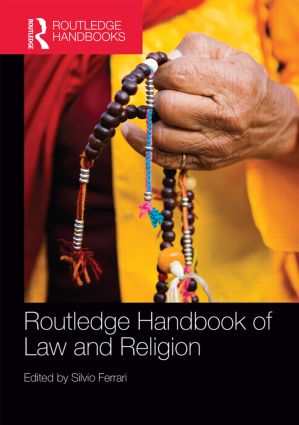Routledge Handbook of Law and Religion

Routledge Handbook of Law and Religion
Silvio Ferrari, ed.
Routledge 2015
The field of law and religion studies has undergone a profound transformation over the last thirty years, looking beyond traditional relationships between State and religious communities to include rights of religious liberty and the role of religion in the public space.
This handbook features new, specially commissioned papers by a range of eminent scholars that offer a comprehensive overview of the field of law and religion. The book takes on an interdisciplinary approach, drawing from anthropology, sociology, theology and political science in order to explore how laws and court decisions concerning religion contribute to the shape of the public space.
Key themes within the book include:
- Religions symbols in the public space;
- Religion and security;
- Freedom of religion and cultural rights;
- Defamation and hate speech;
- Gender, religion and law;
This advanced level reference work is essential reading for students, researchers and scholars of law and religion, as well as policy makers in the field.
Introduction: The challenge of law and religion, Silvio Ferrari, Part 1: Interdisciplinary perspectives on law and religion 1. Law and religion in the Biblical canon, Michael Welker 2. Law and religion in the Western legal tradition, John Witte 3. Anthropological perspectives on law and religion, Martin Ramstedt 4. Sociology at the intersection between law and religion, Effie Fokas 5. The contribution of law to interdisciplinary conversations on law and religion, Peter W. Edge Part 2: Freedom of religion or belief as a human right: critical reflections 6. The impact of definitional issues on the right of freedom of religion and belief, Arif A. Jamal 7. International law and freedom of religion and belief: Origins, presupposition and structure of the protection framework, Pamela Slotte 8. Legal responses to religious diversity (or to cultural diversity?), Prakash Shah 9. Religious freedom as equality, Frederick Mark Gedicks 10. Religion and human rights: Deconstructing and navigating tensions, Eva Brems and Lourdes Peroni 11. Human rights within religions, Marco Ventura 12. Reframing the state in eradicating discrimination: Freedom of religion or belief and non-discrimination, Nazila Ghanea 13. Conscientious Objection, Javier Martínez Torrón 14. Constitutional models and the protection of religious freedom, John T.S. Madeley Part 3: Law, religion, state and society 15. Secular politico-legal regimes in religiously homogenous and diverse societies, Rajeev Bhargava 16. A religious revival in family law, Jane Mair 17. Law, religion and the school, Myriam Hunter-Henin 18. Law, religion and the workplace, Lucy Vickers 19. Law, religion and economics, Niels Kærgård 20. Religious bioethics and biolaw, Christian Byk Part 4. Controversial issues 21. Law, religion and gender, Ayelet Schachar 22. Law, Religion and Security, Nadirsyah Hosen 23. Curbs and turbans: Challenging (tur)bans, Hana M.A.E. van Ooijen 24. Limitations on religious freedom in Islam: Rethinking through the Maqasid?, Abdullah Saeed 25. Blasphemy, defamation of religion, religious hate speech, Jeroen Temperman 26. Proselytism, Tad Stahnke